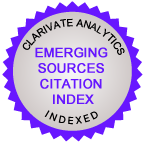Hinchas e identidad. Alcances y limitaciones de la ética del aguante
-
Germán Hasicic
 germanhasicic@gmail.com
germanhasicic@gmail.com
Downloads
Abstract
Desde el punto de vista sociocultural, el fútbol es una práctica festiva generadora de procesos de identidad y mecanismos de reconocimiento. Debemos entenderlo desde una lógica simbólica, como catalizador de identidades sociales, regionales, nacionales y continentales. Las identidades futbolísticas se articulan hoy en términos tribales. Asimismo, esta articulación se pone de manifiesto en las hinchadas y a partir de una estrecha relación con un territorio atomizado.Palabras Clave
Similar Articles
- José Luis Torres-Martín, Andrea Castro-Martínez, Pablo Díaz-Morilla, Cristina Pérez Ordóñez, Women executives and creators in the audiovisual sector. Analysis of Spanish fiction series in the catalogs of Amazon Prime Video, Movistar+, and Netflix (2019-2021) , Perspectivas de la Comunicación: Vol. 15 No. 2 (2022): July - December
- Montserrat Vidal-Mestre, Alfonso Freire-Sánchez, Maria Fitó-Carreras, The journalistic discourse and the elements of message transmission in the podcast and the audiovisual docuseries of true crime. The case of El asesino de la baraja , Perspectivas de la Comunicación: Vol. 17 (2024): January - December
- Alfredo Arceo Vacas, Rafael Barberá González, Sergio Álvarez Sánchez, The context of perception generated on Twitter for the Spanish electoral debates of December 2015 and June 2016: treatment of the credibility factors by the candidates , Perspectivas de la Comunicación: Vol. 13 No. 2 (2020): July-December
- Francisco Javier Alonso-Flores, Carolina Moreno-Castro, Antonio Eleazar Serrano-López, Researchers‘ age, gender and professional status as indicators of the Twitter perception in science dissemination , Perspectivas de la Comunicación: Vol. 12 No. 1 (2019): January - June
- Xavier Ginesta, José Luis Rojas Torrijos, Nahuel Ivan Faedo, Sports journalists and North American investors in LaLiga: disintermediation and "disneyization" in RCD Mallorca , Perspectivas de la Comunicación: Vol. 16 No. 1 (2023): January - June
- Carlos Rusconi, Eugenia Roldán, Local media and political practices: notes for addressing mediatization. , Perspectivas de la Comunicación: Vol. 14 No. 1 (2021): January - June
- Federico Álvarez Gandolfi, Cibercultura Otaku. Un anáisis interdiscursivo de identidades fan puestas en escen en grupos de Facebook , Perspectivas de la Comunicación: Vol. 9 No. 2 (2016): Setiembre – Diciembre
- Baal Ulises Delupi, Carnival, all my life! Artivistic Resistance Speeches in Barcelona: The Case of Enmedio , Perspectivas de la Comunicación: Vol. 15 No. 1 (2022): January - June
- Elena Francés Tecles, Ramón Camaño Puig, Internal communication in primary health centers: A nursing perspective , Perspectivas de la Comunicación: Vol. 16 No. 2 (2023): July - December
- Victoria Isabela Corduneanu, Dra., Carlos Muñiz, Dr., Martín Echeverría, Dr., Emotions in electoral context and political attention to mass media: affective intelligence or cognitive evaluation? , Perspectivas de la Comunicación: Vol. 12 No. 2 (2019): July - December
1 2 3 4 5 6 7 8 9 10 11 12 > >>
You may also start an advanced similarity search for this article.
Downloads
Published
How to Cite
Issue
Section
License
- Proposed policy to offer Open Access Journals
Authors who publish with this journal agree to the following terms:
a) Authors retain copyright and grant the journal right of first publication with the work simultaneously licensed under a Creative Commons Attribution Attribution (CC -BY 4.0) ![]() that allows others to share the work with an acknowledgement of the work's authorship and initial publication in this journal.
that allows others to share the work with an acknowledgement of the work's authorship and initial publication in this journal.
b) Authors are able to adopt licensing agreements for the non-exclusive distribution of the journal's published version of the work (for example, to post it to an institutional repositories or publish it in a monograph), with an acknowledgement of its initial publication in this journal.
c) Authors are allowed and encouraged to post their work online (For example, in institutional repositories or on their website) prior to and during the submission process, as it can lead to productive exchanges and increase the citation of published work (See The Effect of Open Access).











